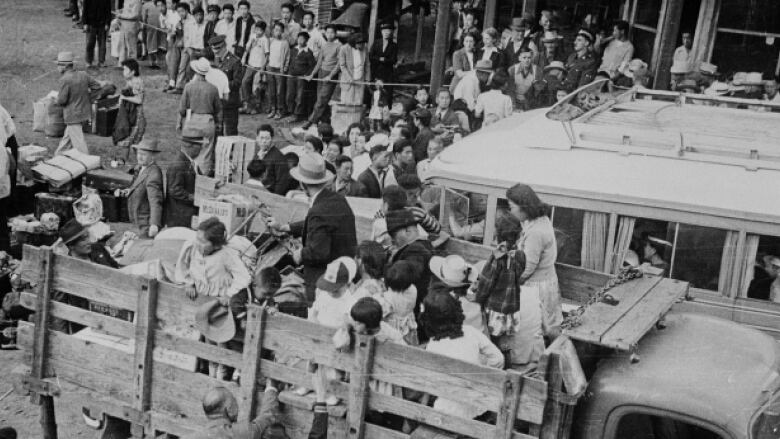30 years after government apology, Japanese-Canadian woman remembers her role in it
Maryka Omatsu was a key member of the team that negotiated redress for Japanese-Canadians

Maryka Omatsu grew up not knowing much about her family's experience being interned during the Second World War, but it was a historical event that later shaped her adult life.
One of Omatsu's grandfathers had a farm in the Fraser Valley, the other ran a grocery shop.
"Like all Japanese-Canadians, they were incarcerated, removed from their homes and communities," she said. "Their property was confiscated and sold."
Her father owned a restaurant in Vancouver that he was forced to abandon. It had been on the corner of Broadway and Granville where a Royal Bank now stands, she told Stephen Quinn, the host of CBC's The Early Edition.
"They didn't speak about those years and actually I didn't learn about it until I was in university," Omatsu said. "I think our parents wanted to protect us and wanted us to have hope and faith in our futures and in the country."
But Omatsu, a civil rights lawyer and the first woman of East Asian heritage to be appointed a judge in Canada, nonetheless became intertwined in the historical event a generation later.
She was part of the team that negotiated a redress agreement with the government for the unjust way Japanese-Canadians were treated during the war.

A change of attitudes
The first challenge was convincing theCanadian public to care about what had happened, Omatsu said.
"We had to make a case that all Canadians could relate to," she explained.
"By the 1980s, there had been a sea change in Canadian attitudes I believed that Canadians, if they knew the story, would support us and they did."
Three decades ago, in 1988, Prime Minister Brian Mulroney officially apologized to Japanese-Canadians for thehistoric wrongdoings.
The government issued a one-time payment of $21,000 to each individual directly affected by the internment. Citizenship was reinstated for those exiled to Japan and the government granted pardons to those wrongfully convicted under the War Measures Act.
A fund was also created to help rebuild the community and $24 million was allocated for a Canadian Race Relations Foundation.
"When they did an opinion poll after the settlement, only 12 per cent of Canadians did not support the settlement," Omatsu said. "There are probably few things that only 12 per cent of Canadians do not agree on."
Omatsu is speaking at UBC on Tuesday, March 13 to commemorate the 30th anniversary of the redress movement.
With files from The Early Edition.












_(720p).jpg)


 OFFICIAL HD MUSIC VIDEO.jpg)
.jpg)



























































































